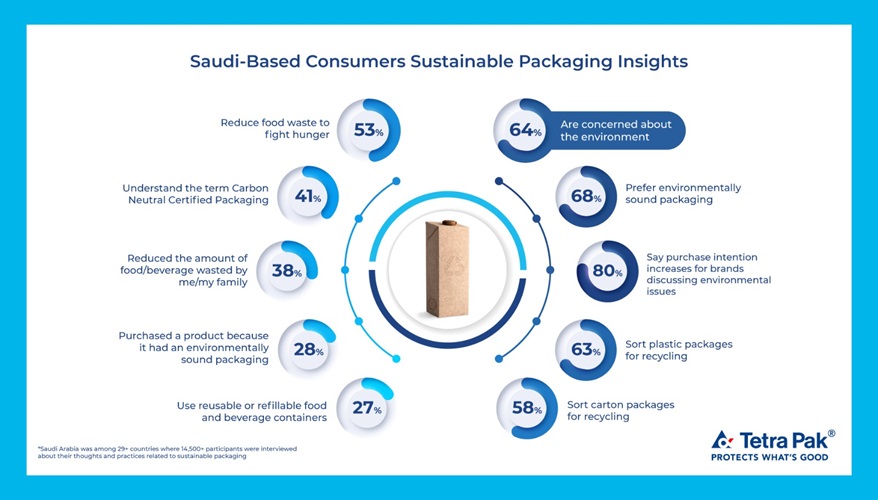Tetra Pak launches “Go Nature Go Carton 3.0” this month to promote the sustainability practices that can transform food systems in the Middle East
Riyadh, Kingdom of Saudi Arabia, 11th June, 2024: Tetra Pak announced today unique insights from the “Global Sustainable Packaging Consumer Research” study, that can have an impact on propelling sustainability practices in the Kingdom of Saudi Arabia. The global research aims to understand the actions taken by consumers to conserve the environment on a country level, and accordingly identify new market trends, industry opportunities and challenges related to sustainability, and provide businesses with valuable insights that can help the latter develop data driven solutions to better align with consumer demands.
The research insights are being revealed as part of the company’s “Go Nature Go Carton” campaign, which highlights the sustainability practices implemented by Tetra Pak to build sustainable food value chains in the Middle East as well as inspire more businesses in the food and beverages industry with practices that bring their sustainability agenda forward.
The global research highlights that 64% of Saudi-based consumers who participated in the study are concerned about environmental issues, pollution, and food waste, and that 53% of the same group reported that their motivation behind reducing food waste is to help fight hunger, where by generating less food waste makes more food available to under nourished communities that would have otherwise been wasted. Also, 27% purchased more local products to mitigate climate impact. Moreover, 80% of the group expressed that their intention to buy a product would increase if a brand talks about environmental topics, and 68% were much more likely to consider the brand if it uses environmentally sound packaging.
Additionally, among the group of Saudi consumers interviewed, 63% reported that they sort plastic packages for recycling and 58% sort carton packages, while 27% used a reusable or refillable package for food and/or beverages, with 28% of the interviewed admitting to have purchased a product because it had environment friendly packaging and 25% opting for packages made from recycled materials – indicating a high level of environmental awareness and sustainable practices in the country.
Tetra Pak also examined food and beverage (F&B) manufacturers’ attitudes toward sustainability in this research, where the study revealed that today’s F&B companies are increasingly minimising plastic use, with three of the top five sustainability commitments involving plastic reduction. Half of the surveyed businesses pinpointed consumer demand as the main catalyst for implementing new sustainable solutions. When asked how packaging and processing suppliers can contribute, 65% of business highlighted the importance of new product developments. Lastly, 77% of global businesses expressed a willingness to accept cost-related trade-offs associated with the implementation of sustainable manufacturing and processing solutions, despite the industry facing ongoing macroeconomic challenges.
Niels Hougaard, Managing Director, Tetra Pak Arabia Area, said: “Businesses proactively adopting sustainability practices is no longer “nice to have” it is now a “need to have”. The consumer sentiment in Saudi Arabia highlighted in this research on this critical issue is an eye opener for businesses. Combined with the fact that the urgency to adopt practices that decarbonise the world’s food systems is expected to increase from 49% to 59% over the next five years according to Tetra Pak’s global research. Businesses need to act now.” Hougaard added: “When we look at the data and insights we have on hand, businesses in Saudi Arabia that prioritise sustainability in their products and their communication strategy can enhance their market appeal and consumer loyalty. This also presents a significant opportunity for businesses to attract and retain customers by investing in sustainable packaging solutions, which will only benefit the F&B industry and our planet. With consumers on our side, we can embark on a transformative journey towards a sustainable future. Their support galvanises businesses to forge ahead with innovative solutions and collaborative efforts.”
The research study was conducted by Lexis Research on behalf of Tetra Pak and involved more than 14,500 online interviews across 29 countries in the Middle East, Africa, the Americas, Europe, and Asia. Researchers conducted 500 interviews in Saudi Arabia, and explored the sample group’s environmental concerns, attitudes, and behaviours. They also examined consumer perception of various packaging types and investigated innovative packaging solutions.
In Arabia Area, Tetra Pak focuses investments on developing more sustainable packaging solutions and increasing recycling while creating a circular economy. The company’s partnership with UPM , a leading UAE-based recycler consists of a SAR 2,5 million recycling agreement signed during COP28. Among others, Tetra Pak is part of a sustainability initiative along with two leading recycling companies in Saudi Arabia, Obeikan Paper Industries (OPI) and Saudi Top Plastic Factory (STP). With a joint investment of more than SAR 12 million for the establishment of a recycling hub, Tetra Pak aims through this partnership to increase the collection and recycling of cartons by creating value for post-consumer cartons, as the goal is to recycle all the components of the packages and to, therefore, contribute to the creation of a circular economy by recycling and marketing potential waste. Both OPI and STP initiated their commercial operations in 2022.
The findings of the “Sustainable Packaging Consumer Research” study also aligns with the launch of Tetra Pak’s “Approach to Nature”, — a framework to halt and reverse nature loss and enhance water security, aligning with global targets. With global food systems identified as major drivers of nature loss by the Intergovernmental Science-Policy Platform on Biodiversity and Ecosystem Services (IPBES), Tetra Pak aims to manage its value chain’s impact and support ecosystem restoration and water resilience. The key targets include:
• By 2025, sourcing 100% of key raw materials from certified or controlled sources.
• By 2025, ensuring 100% of high water-impact suppliers report on water use and quality.
• Eliminating waste-to-landfill from production sites by 2030.
• Reducing water use in best practice processing lines by 50% by 2030 compared to 2019.




